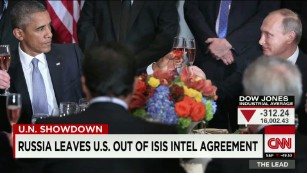Did his experience in Ukraine tempt Vladimir Putin to begin Russia's Syrian expedition? Are they both examples of the Kremlin taking advantage of Western hesitation or caution? Or are they two episodes (with more to come) of Russia taking revenge for previous humiliations (Kosovo, Iraq, Libya, etc.) and reasserting itself as a Great Power?
Do
we yet have any idea what the Russian President's endgame is? Is he a
master strategist or a cunning magician disguising Russia's relative
decline? Russia's sudden and forceful intervention in the four-year
Syrian conflict poses plenty of questions.
Comparisons
of events in Ukraine and Syria should not be overdone. The
circumstances and the geography are different. In Syria, the Russians
were invited in by a government; in Ukraine most certainly not. In
Syria, Russia is projecting power and trying to influence the shape of
the Middle East; in Ukraine, it is acting in its backyard. Last year,
Putin even asserted of Ukraine: "We are one people. Kiev is the mother
of Russian cities."
In Syria,
the intervention is overt and trumpeted as Russia deploys the best of
its air force; in Ukraine, it is denied with a shrug as Moscow relies on
surrogates with varying degrees of discipline.
Obscure intentions
Even so, Russian intentions in
Syria and Ukraine do seem part of a pattern. Russia is trying to help
allies strengthen their bargaining position while being less than clear
about its own role and ends. In Syria, for example, Putin has spoken
about the war against ISIS, but Russia's target list clearly includes
any of Syrian President Bashar al-Assad's opponents that threaten the
regime's heartland.
At
the United Nations, Putin waxed lyrical about taking on the threat of
ISIS. On Sunday, Russian officials spoke of hitting ISIS positions in
the province of Idlib, where ISIS has no presence.
And
it's not clear yet whether Russia's priority is to help the Syrian
regime go on the counterattack or guarantee access to the Mediterranean
for its military in a post-Assad chunk of Syria on the coast.
In
Ukraine, Moscow is sustaining the rebels with equipment and supplies to
enable them to hold big chunks of the Donbass, while denying that it is
involved in their revolt. Some see the ultimate aim as annexation (de
facto or formal) of eastern Ukraine and its heavy industry; others a
sort of collar to be tugged anytime President Petro Poroshenko cozies up
to the European Union or NATO.
For
now, that second aim seems more likely. Putin seems reluctant to invite
more U.S. and European sanctions by upping the ante, and he said last
week there was hope the Ukrainian crisis "can be dealt with." Some rebel
leaders in eastern Ukraine are suggesting eastern Ukraine might fall
into some sort of limbo, like Russian enclaves in Georgia and Moldova.
Sourced from cnn.com

No comments:
Post a Comment